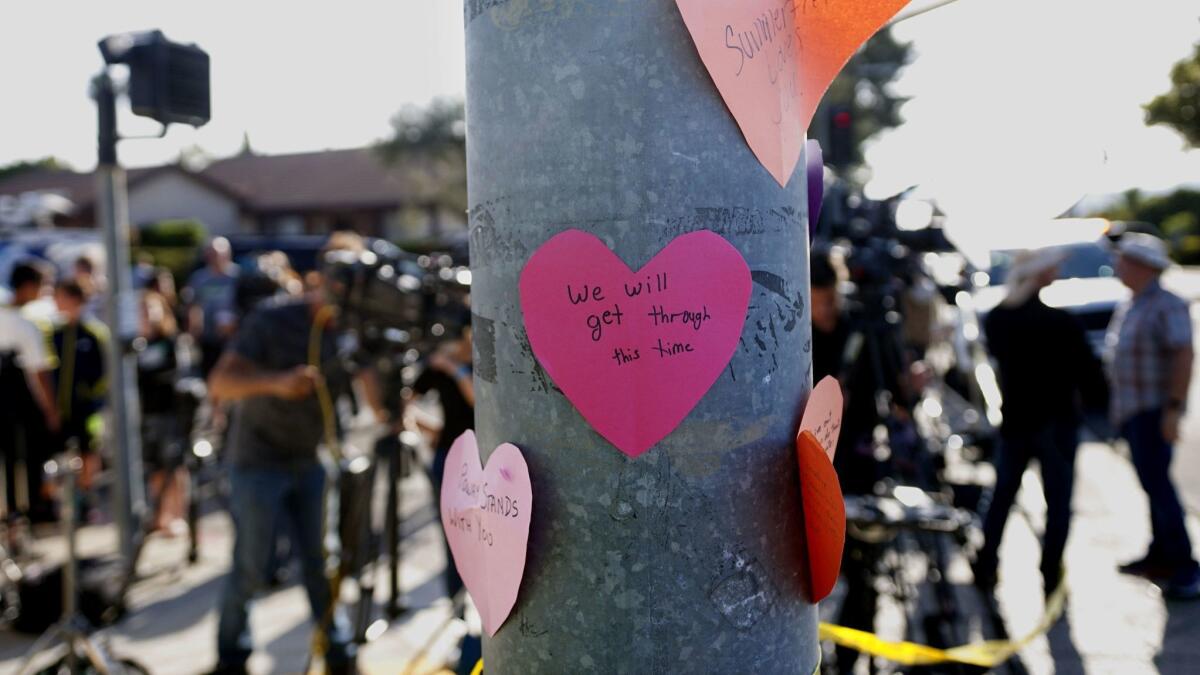Op-Ed: Synagogue shootings will never crush American Jewish life

A few hours after the Saturday attack on the synagogue in Poway, I was at a mimouna — the Moroccan Jewish party that celebrates the end of the eight-day Passover holiday. An older woman was busily rolling balls of dough into flat discs, roughly the size and circular shape of handmade flour tortillas. She laid them on a griddle until they were fragrant and golden brown, then piled them on a plate.
The host of the mimouna, a young TV and film producer, took these warm mufleta — the traditional Moroccan Jewish end-of-Passover treat — and smeared them with sweet butter and honey before passing them out to the ravenous crowd.
And what a crowd. This being a West Hollywood mimouna, the stylish home was packed with guests from the worlds of film, fashion and tech. Steps from a glowing blue pool, a DJ was blasting Middle Eastern and North African techno to a full dance floor and the wine was flowing. It was nothing but fun and release.
So what is the future of American Jewish life: horrific synagogue shootings and rampant anti-Semitism or joyous, carefree post-Passover celebrations?
It’s understandable we might not see this larger picture because in the aftermath of terror attacks, peddling good news feels gauche.
Based on the reactions to the Poway shooting, you’d have to choose the bleaker options. You’d have to believe it’s three minutes to midnight for American Jewry, time to grab the luggage and go.
Given our shared Jewish history, it’s easy to understand the impulse. In the not-so-distant past, so many Jews refused to see the writing on the wall until the walls closed in. But if we view 2019 only through the lens of 1939, we are missing the central truth of these attacks: It’s not just about Jews. Yes, we are vulnerable, but in our 3,000-year history, we have never been more accepted, powerful, even beloved. Yes, we are victimized, but we are not the only targets. Yes, we have enemies, but we have far more allies.
It’s understandable we might not see this larger picture because in the aftermath of terror attacks, peddling good news feels gauche. In the wake of the Pittsburgh synagogue attack that killed 11 congregants six month ago, and again after the Poway shooting, the media repeated the same shocking American Defamation League findings that in 2017 anti-Semitic acts rose by 57% from a year earlier.
Yet the ADL found the number of anti-Semitic assaults in 2017 actually fell by 50% — from 36 to 19 — over the previous year in the United States, a country with over 600,000 violent assaults each year.
Meanwhile, another 2017 statistic has received less attention: A Pew poll found that more Americans feel warmly toward Jews than toward any other religious group.
The ADL’s just-released 2018 survey shows some anti-Semitic acts increased, some declined, and overall numbers to be about what they were in 1991. But over the past five decades, the United States, according to a 2018 analysis by political scientist Jeffrey E. Cohen, “has become a much more accepting nation” toward Jews.
That’s why, when I think about Poway, I also think of the mimouna. Because any discussion of the threats to Jewish American life that doesn’t mention its utter vibrancy is deceptive. Any warning about American anti-Semitism that doesn’t speak of America’s embrace of Jewish life and culture is a flat-out lie. Commentaries about these rare but horrific attacks that are all “oy” and no joy risk masking the more complicated reality of American Jewish life and the forces that threaten it.
Difficult as it may be for American Jews to see, those forces aren’t just targeting Jews. They threaten all minorities. A small cohort of largely white Americans is striking out against a society they perceive as increasingly ethnically and religiously diverse.
The Poway shooter reportedly cited as inspiration the Christchurch mosque shooting in New Zealand that killed 50 Muslim worshipers. Police are investigating claims that a month before the synagogue attack, the Poway shooter set fire to a nearby mosque.
Anti-Semitism is fundamental to the worldview of these white nationalists, but it is welded to their hatred of immigrants, people of color, homosexuals and Muslims.
Enter the Fray: First takes on the news of the minute »
They hate Jews, but they hate everyone else too. The white nationalist who killed nine black parishioners in South Carolina in 2015 had posted screeds against Jews and Muslims. The day before 60-year-old Lori Gilbert-Kaye died protecting the rabbi at Chabad of Poway, a driver in Sunnyvale, Calif., rammed his truck into a group of people he assumed were Muslim, police say, and left a 13-year-old girl of South Asian descent in a coma with severe brain trauma.
The white nationalist movement is a clear and present danger to the free exercise of religion in the United States. This is not a time for Jews to fear and panic, but a moment to join with formidable allies and fight back. It’s a time to work to turn the full force of public opinion, regulation, law enforcement and private enterprise against the white nationalist movement.
A relative handful of white nationalists lash out, pathetic in their hate. Jews have the company of other minorities, the political establishment and the vast majority of a supportive, accepting America.
We have good reason not to fear. This time, we are not fighting alone.
Rob Eshman is the former editor-in-chief and publisher of the Jewish Journal.
More to Read
A cure for the common opinion
Get thought-provoking perspectives with our weekly newsletter.
You may occasionally receive promotional content from the Los Angeles Times.










